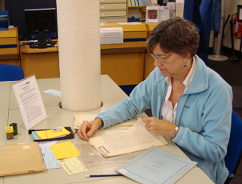

In nonfiction writing, careful research is critical.
For two years I researched the true story behind my middle grade historical fiction novel SOS: Trapped in a Hurricane. Along the way I found a book that gave the wrong date of the incident, off by one entire year!! Fortunately, earlier I had discovered a fifteen page blow-by-blow account of the disaster in the captain’s own words. I had also rounded up newspaper articles of the day, reporting what was known as each day passed. These two kinds of documents are known as “primary sources” and are a writer’s most trusted resources. I knew exactly when this captain and his crew had been struggling for survival within the hurricane, and it wasn’t the date published in that book.
Unfortunately, errors like the one described above sometimes make their way onto the Internet. Then other websites reprint the misinformation word for word. That can make it seem like the truth. The Internet can be a good place to find general information, but is not reliable enough to be one’s only source. Even if it comes from a highly respected organization, such as The National Institute of Health, a university, or a museum site, an online fact should always be double-checked. And, as I found, even books can contain mistakes.
I learned some valuable lessons that might help you in doing research:
- Search for primary sources.
- Never use the Internet alone as a source.
- Consult books on the subject from a reliable publisher/author/organization. (Books from reliable sources are often already fact-checked by people hired to do just that.)
- Find at least two sources that agree on a given fact.
- If your gut tells you a piece of information seems questionable, keep looking until you can support the claim.
- If you cannot verify information, leave it out. (Sometimes that may mean abandoning a subject altogether.)